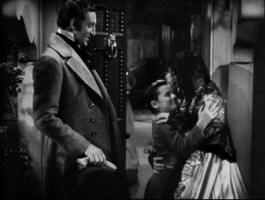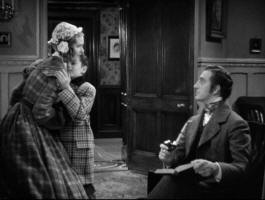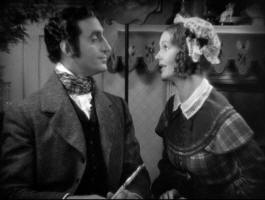|
|
David
Copperfield
|
 "David, you shouldn't be rude. Mr. Murdstone's taken so much trouble to bring me home." |
 David's mother waves to him while Murdstone looks on, disapprovingly. |
Some months later David learns that he is going to get a baby brother or sister, but both Clara and the baby die in childbirth. With David's mother now gone, Miss Murdstone fires Peggotty, and Murdstone says to David, "I'm afraid I've no place for you in my house now. You have a rebellious disposition. It must be conformed to the ways of the working world. It must be bent. Even broken if necessary." And so, Murdstone sends David to London to work and arranges for David's lodging with Mr. Micawber's family. Micawber and David become friends for life. Micawber has a cash flow problem and ends up in debtors' prison. After his release the Micawber family leaves London, and David resolves to find his Aunt Betsey Trotwood.
Having been robbed of everything he owns, young David walks all the way to Dover—72 miles. By the time he gets to his aunt's home, his clothes are rags. Although Betsey Trotwood doesn't like boys, she takes pity on poor David and gives him a bath and clean clothes. She then contacts Murdstone, and he and his sister come to Betsey's house to fetch David. Betsey stands up to them, saying she knows how they treated Clara, and how Murdstone broke Clara's heart, how at first he was smooth and silky with her, worshipped her, doted on her little boy. He was to be a father to the boy, and they were all to live together in a garden of roses. "And when you had made sure of her, you began to break her, like a poor bird in a cage, tormented the girl through her boy. You gave her wounds that she died from." Chastened, the Murdstones leave and are not heard from again. Aunt Betsey's stern countenance softens and she embraces David.
Aunt Betsy takes good care of David, and sends him to school in Canterbury, where he meets the Wickfields and that very 'umble and scheming Dickens character Uriah Heep. As a young man, David finally rises above his misfortune and eventually marries Agnes Wickfield.
|
All the important characters in Charles Dickens' immortal "David Copperfield" are now living on the Capitol screen, where the highlights of the widely read novel are to be seen in a tender, amusing and oft heart-rending screen version. In order to get in enough material on the many masterfully-drawn characters of the book to make each one of them recognizable and as much a part of the warp and woof of the pictures as they were of Dickens' book, the adaptor, Hugh Walpole, the scenarist, Howard Estabrook and the director, George Cukor, had to make this an unusually long film. It runs, as it stands now, two hours and ten minutes. That is much too long for an ordinary picture, but in the case of Metro-Goldwyn-Mayer's production of "David Copperfield" that length is justified by the results. there are several scenes that might have been shortened without injuring the story, but on the whole, the tale of David's joys and tribulations is absorbing enough to keep one intent on the film throughout. One has to see the picture to appreciate the great and loving care that went into the production. The players selected for the various characters, with the possible exception of Roland Young as Uriah Heep, are as nearly perfect as a Dickens' fan could wish. Little Freddie Bartholomew, who plays the child David, is an ideal selection and a real film find. He is destined for fame and may now be classed with the other important child players of the screen. He enters into the character of the young David so thoroughly that he makes the audience laugh with him at his joy in his mother's gay spirits and his interest in his beloved nurse's affair of the heart with the terse but friendly Barkis, and weep with him at his mother's untimely death and shudder at the cruel treatment he receives from his stern step-father, and delight in his friendship for the dignified Micawber and cheer when his eccentric aunt, Betsey Trotwood, takes him in to live with her and the smiling and simple Mr. Dick. Frank Lawton, as the older David, gives a truly fine performance, as we see him meeting the flighty Dora for the first time and taking his friend Steerforth to visit the Peggottys. His friendship for Agnes and Mr. Wickfield is touched upon and his uncovering of the deceitful Heep's crooked work is one of the most exciting scenes in the picture. We are given a glimpse of the topsy-turvy household which Dora keeps for him after his marriage and the film ends on his reunion with Agnes after Dora's death. Jessie Ralph is tender and loving as Peggotty. W.C. Fields' selection as Micawber was an inspiration on the part of the producers. Edna Mae Oliver's Aunt Betsy is one of the outstanding characterization of the film, and Maureen O'Sullivan, as Dora, Madge Evans as Agnes and Elizabeth Allan as David's mother give satisfaction in their various roles. Basil Rathbone is excellent as the hard-hearted Murdstone and Violet Kemble-Cooper, thoroughly disguised in a black wig and heavy dark brows, makes an impression with her stiff-backed Jane Murdstone. Lionel Barrymore's Dan'l is well done and Jean Cadell as Mrs. Micawber, Hugh Williams as the treacherous Steerforth, Lewis stone as Wickfield, Una O'Connor as Mrs. Gummidge and Lennox Pawle in the role of Mr. Dick help to make the picture a memorable screen event. Roland Young reads his part competently, but he fails to suggest the evil, leering Uriah that lived in the pages of the book. The photography is of a high order and the entire production has been carefully mounted and given the proper Dickensian atmosphere. —Kate Cameron, New York News, January 19, 1935 |
Sixty-five stars and featured players bring Charles Dickens' immortal story of David Copperfield and his adventures to life in an inspired cast headed by W. C. Fields as Mr. Micawber, Lionel Barrymore as Dan Peggotty, Maureen O'Sullivan as Dora, Madge Evans as Agnes, Edna May Oliver as Aunt Betsey, Lewis Stone as Mr. Wickfield, Frank Lawton as David the man, Freddie Bartholomew as David the child, Elizabeth Allan as Mrs. Copperfield and Roland Young as Uriah Heep. Basil Rathbone, billed eleventh in this star-studded cast, was splendid as David's cruel, abusive stepfather Mr. Murdstone.
This great picture, more than a year in the making, was directed by George Cukor and nominated for three Academy Awards in 1935: Best Picture, Best Assistant Director (Joseph Newman) and Best Film Editing (Robert J. Kern). (Mutiny on the Bounty won Best Picture that year.)
Fans of Dickens' novel will not be disappointed with the film version of David Copperfield. The story has been followed with complete fidelity, and includes the wonderful, memorable characters that Dickens stuffed his novels with.
Parent's Magazine (March 1935) chose David Copperfield as the "Outstanding Motion Picture of the Year." A National Critic's poll named David Copperfield as "Best Production of the Year."
For his performance as Murdstone in David Copperfield, Basil Rathbone was awarded the Box Office Blue Ribbon Award for 1935.
 David's new Pa |
 Murdstone admonishes Clara for showering affection on David. |
Filming of David Copperfield took place from September 17 to November 28, 1934. Although the studio rushed to get the picture ready for a Christmas release, it wasn't ready until January. It was released in New York City on January 18, 1935.
David Copperfield earned $55,750 in the first week at the Capitol in New York City, and that was in spite of a two-day snowstorm. It continued to earn well for the next 5 weeks and turned out to be Metro's greatest success in years.
The film was re-released in June 1938, and again in 1962.
The story of David Copperfield has been dramatized many times. There were two silent films prior to this 1935 version: one in 1913 and one in 1922. Also, a short silent film was made in 1911. A recent film was made in 2019.
TV movies were made in 1970, 1983, 1993, 2000, and 2009. TV mini-series were made in 1974, 1986, 1965, and 1999. There were regular TV series in 1956 and 1966.
|
Without derogation to the adapters and producers, the chief factor in the success of 'David Copperfield' is due more largely to those concerned in the casting than to the others. It is one of the most evenly good casts ever to have been assembled and it is due more to this than to any other factor that the picture probably will be a large grosser, helped not a little by the heavy advertising campaign in national publications. Dickens did not write with the idea of being dramatized. The strange charm of his characters is more important than the fidelity of his characterizations. His people lend themselves more successfully to the caricatures of Phiz than to the dramatist, and the comparatively few plays have been made from his works have been liberally adapted rather than reproduced. It was almost an adventure to try to bring to the screen the expansively optimistic Micawber, but he lives again in W.C. Fields, who only once yields to his penchant for horseplay. In the main he makes Micawber as real as David. The same may be said for Edna May Oliver who does low comedy in the high comedy manner and shows flashes of the underlying tenderness of Aunt Betsey. The adapters have not always been as successful. Now and then they linger too elaborately in a scene and they put the play completely off the track in introducing the mechanically melodramatic shipwreck scene, which might easily have been left undone. Apparently with the idea that the story needed some such punch, they go completely Hollywood at this point, with the net result that they obtain a disconcerting sequence which rasps the sensibilities. With such a mass of [illegible], it is essential to write briefly and to strike chiefly the highlights of the story. This in the main has been done, with most of the episodes carefully evaluated, but now and then a foot slips, as in the long-drawn-out tramp to Dover, with the narrative unable to advance until the town is reached. For the sake of the comedy, and perhaps also as a sop to Miss Oliver, there is a double dose of the donkey episode, and at other points there is too much time allotted matters which are no more important than others which have been cramped. But by and large, the writers have done an excellent continuity; one which carries the story and still does not impress as being much overlong, though nearly a half hour could be cut without injury and perhaps to the benefit of the production. Staging and costumes are almost always excellent, though in one scene some very modern looking letter files and transfer cases do not suggest a lawyer's office of the period indicated. The photography is above average, but several times the trick is used of lighting a strip of a player's face while the rest is in shadow. It might be objected, too, that the shadows of the ballet dancers would not be reflected upon the wall of the box, since the stage illumination is from the front and sides and not from the rear. Still, these minor faults are outweighed by the generally good work. In a cast of such general excellence, it is difficult to select individual players for especial mention, for there are a dozen outstanding characterizations because of the importance of these players to the scene. As mentioned, Fields gets entirely away from his usual line. His scene in which he denounces Heep is outstanding. It is humorous and sensational at the same time, with never a slip to spoil the effect. The Heep of Roland Young is another pleasant surprise. This part could so easily have been overplayed, but Young never goes over the border. He is cringing and domineering at the same time, and never overstresses. Lionel Barrymore proves again that it is possible to wear chin whiskers and still not be a comic, and Herbert Mundin does well by the willing Barkis. Lennox Pawle has another character pitfall, that of the childish Mr. Dick. Here, too, good acting saves from inanity. These character parts take precedence over the straight players. A fine performance is that of Freddie Bartholomew as the child David. He is acceptable in his more quiet moments, but in times of stress he seems to be spurred up to the situation, and with Basil Rathbone, the Murdstone, he raises the whipping scene to a high point. Rathbone is not as happily cast as the others. It really is the toughest assignment of the entire cast, but he does what can be done with the bit. Frank Lawton is a believable grown David and Maureen O'Sullivan, Madge Evans and Elizabeth Allan, as the three chief women, all rate bows. Of the women Edna May Oliver drew the only burst of applause at the showing caught. this followed her scene with the Murdstones, and she earned every last pat. Not to mention the others is merely to say that they were given less opportunity. There is not a part that is not well played. It is certainly one of the best ensembles ever. Chic. —Variety, January 22, 1935 |
David Copperfield made a star of Freddie Bartholomew, a ten-year-old boy from London, England. He went on to appear in such classics as Anna Karenina (1935), Little Lord Fauntleroy (1936), and Captains Courageous (1937).
In one of the longest searches in the history of Hollywood, MGM spent seven months interviewing 10,000 boys for the role of David before finally choosing Freddie Bartholomew. Selznick said, "Freddie was the final choice because of his unaffected personality, his wholesome boyishness, and his decidedly British manner of speech." (Hollywood, May 1935)
Young Freddie was so steeped in his Dickens that he could not help associating Rathbone with Mr. Murdstone, the monster step-father. He saw Rathbone only as Murdstone and therefore hated him. The fear you see in Freddie's scenes with Rathbone is real; Freddie was afraid of Basil. Eventually, Freddie discovered that Basil wasn't at all cruel and mean, and a friendship between them blossomed. The two actors grew to be close friends during the filming of Anna Karenina, in which Basil played a loving and protective father to Freddie. Movie Mirror even published an article about their friendship ("Freddie Bartholomew's Adopted Father," Movie Mirror, January 1936).
 Murdstone and his sister take over management of the house. |
 "I'm sure I managed very well before we were married . . . . I thought you were pleased." |
When Rathbone was first offered the role of Murdstone, he refused it, believing that he couldn't play a part he loathed. "You can't play a man who's poison to you." In an interview Rathbone stated "I refused the part of Murdstone five times and finally took it as one takes any desperate chance—with my heart quaking and my fingers crossed. When Rathbone saw the film, he hated the thought that he could look so cruel. "I even hated George Cukor at times—childishly, illogically—for the things he made me do. . . . Whatever credit's due belongs not to me, but to him. . . . He can get anything out of anyone—the tenderest sentiment, the bitterest cruelty. He wanted cruelty from me and he got it." (Paula Harrison, "It's Cheers for Basil Rathbone Now," Motion Picture, August 1935)
But he found it an unpleasant experience to thrash little Freddie Bartholomew with sadistic delight, even though the small boy was padded with foam rubber for protection. In his autobiography Rathbone wrote that the scene in which he had to thrash Freddie Bartholomew was an extremely difficult one. He was very fond of Freddie, and when the thrashing scene was over, Rathbone took Freddie in his arms and kissed him. "When the picture was released I received good reviews and a very heavy fan mail—all of it abusive!" (In and Out of Character, p. 138) Rathbone had played the villain so well that he was now typecast as a villain.
In Motion Picture magazine, Rathbone commented on how much he hated his screen self in David Copperfield. "When I had to beat Freddie Bartholomew," he said, "I wanted to go to the producer and tell him that I couldn't do it, I was through. But there was no other way out. I had to do that beastly thing. When I came home in the evening my wife said, 'You look ill.' I was. I told her I had done the most terrible thing in my life. ...
"Murdstone is supposed to have done me a lot of good ... When David Copperfield was released, they treated me as if I had
just been discovered, as if I hadn't been acting since I was eighteen. They
wanted me to play more Murdstones. Never in my life will I play another
Murdstone. He was so cruel, so heartless. A murderer can be very kind to a
dog, but Murdstone was the sort of man that would beat a dog to death. He
did not have a single redeeming feature. Many of Dickens' characters are
caricatures, but so exaggerated."
—Leonard Soule, "Hissed to the Heights," Motion Picture (July 1936)
Watch the trailer for David Copperfield:
See Page Two for more reviews of the film. See Page Three for pictures of posters, lobby cards and promo photos.
.
|
|
David Copperfield is available on DVD
|
Images on this page and pages two and three are from the film "David Copperfield," copyright MGM.











